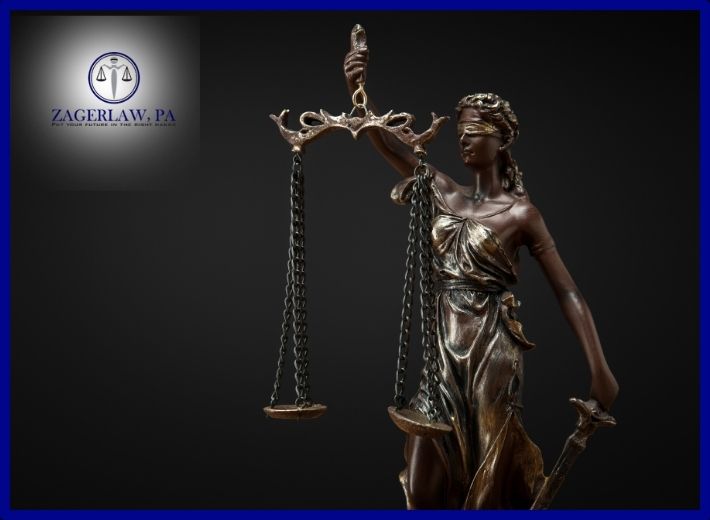A felony conviction is a life-altering event that carries significant consequences, both immediate and long-term. Felony convictions can affect employment opportunities, housing options, voting rights, and even personal relationships. Understanding what happens after a conviction is crucial for navigating the challenges ahead and planning for the future.
The criminal justice system is very complex. ZAGERLAW, P.A., will resolutely represent you to achieve the best possible outcome. We understand the inner workings of investigations and how prosecutors assemble their cases. When you work with ZAGERLAW, P.A., you tip the scales of justice in your favor and can have peace of mind that you have the best lawyer in Fort Lauderdale, Florida, in your corner. To set up a free and completely confidential legal consultation, call our law offices today at (954) 888-8170.
Consequences and Options after a Felony Conviction
The most common types of crimes considered felonies:
• Murder
• Rape
• Arson
• Aggravated Assault
• Theft
Penalties for a felony conviction
Most states punish those convicted of lesser crimes, such as misdemeanors, with community service, fines and minimal jail time. A felony conviction carries more serious penalties and fines than a misdemeanor. Most felony convictions carry heavy penalties such as several years in a state prison or county jail, a large fine or both in some cases. When someone breaks a federal law, the case is tried at that level, and a convicted person will typically serve time in the national prison system versus a state prison.

The most serious punishment in a felony conviction is the death penalty. The death penalty is only given when someone is convicted of murder. Certain states have the death penalty in place for a person convicted of murder. In this case, an appeal process is mandatory. The appeal process is very complicated and should be handled by a criminal defense lawyer experienced in appeals.
If you are convicted of a felony, the court may also require that you pay restitution to the victim. Restitution is when someone convicted of a crime must financially compensate a victim, the victim’s family or the state.
Probation and parole after a felony conviction
Not all felony convictions require jail time. The penalty for some felony crimes can include probation or parole. In order to determine if a person convicted of a felony can qualify for probation or parole, certain factors have to be taken into consideration such as:
• Past criminal history
• Time spent in jail awaiting trial
Certain felony convictions are eligible for probation. Probation is the suspension of jail time. Another option is for a person to serve part of a prison term before being placed on probation. It is important to understand that probation does not mean you are completely free. Certain conditions are placed on a person on probation. These may include maintaining a job and getting counseling. When you are on probation, any violation of the terms of your probation could result in severe penalties, including a return to prison.
Similar to probation, parole is an alternative to doing time in prison. Parole is the conditional release of a convicted criminal before the full prison sentence has been served. A person on parole (parolee) and must follow a strict set of conditions. Parolees have to check in with a parole officer on regular basis, either weekly or monthly. Any violation of the terms will send the parolee back to prison.
A skilled criminal defense attorney may be able to help you negotiate probation or parole as an alternative to serving your full penalty in jail.

Appealing a felony conviction
Appealing to a higher court is an option for someone with a felony conviction. However, appealing a criminal conviction can be very difficult to do. In order to get a conviction reversed, a person has to prove that some mistake was made in the criminal justice process during the initial trial and it led to the conviction. It is recommended to seek legal advice from a knowledgeable criminal defense attorney.
Expunging a felony conviction
Felony convictions permanently stay on your record. A felony on your criminal record can have far-reaching consequences. Among them are limitations on employment opportunities or options when looking for housing. For these reasons, people with a felony opt to expunge their criminal records. Expungement is when a criminal record is destroyed or sealed.
Many jurisdictions will not allow someone found guilty of a violent felony to expunge their criminal records. The rules are very strict and are established by the state. The first step in getting a criminal record expunged is to consult with a criminal defense attorney who is familiar with the rules surrounding expungement and the laws in your state.
Life after a felony conviction
A person can end up with a felony conviction for many reasons. Facing a felony is a tough life situation, there are options. Once a person does their time and/or pays restitution they often have the option to request probation or parole and possibly appeal or expunge the conviction at a later time.

Worried about the consequences of a felony conviction? Let our knowledgeable criminal justice lawyers help you navigate the challenges. Contact us today at 954-888-8170, or email [email protected]. We can also be found on Instagram here.
Reference: [https://www.hg.org/legal-articles/what-happens-after-a-felony-conviction-33382]

